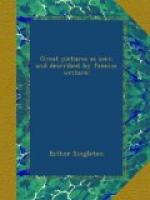I have no hesitation in asserting this picture to be by far the most precious work of art of any kind whatsoever, now existing in the world; and it is, I believe, on the eve of final destruction; for it is said that the angle of the great council-chamber is soon to be rebuilt; and that process will involve the destruction of the picture by removal, and, far more, by repainting. I had thought of making some effort to save it by an appeal in London to persons generally interested in the arts; but the recent desolation of Paris has familiarized us with destruction, and I have no doubt the answer to me would be, that Venice must take care of her own. But remember, at least, that I have borne witness to you to-day of the treasures that we forget, while we amuse ourselves with the poor toys, and the petty, or vile, arts, of our own time.
The years of that time have perhaps come, when we are to be taught to look no more to the dreams of painters, either for knowledge of Judgment, or of Paradise. The anger of Heaven will not longer, I think, be mocked for our amusement; and perhaps its love may not always be despised by our pride. Believe me, all the arts, and all the treasures of men, are fulfilled and preserved to them only, so far as they have chosen first, with their hearts, not the curse of God, but His blessing. Our Earth is now encumbered with ruin, our Heaven is clouded by Death. May we not wisely judge ourselves in some things now, instead of amusing ourselves with the painting of judgments to come?
The Relation Between Michael Angelo and Tintoret (London, 1872).
AURORA
(GUIDO RENI)
CHARLOTTE A. EATON
On the roof of the summer-house of the Palazzo Rospigliosi, is painted the celebrated fresco of Guido’s Aurora. Its colouring is clear, harmonious, airy, brilliant—unfaded by time; and the enthusiastic admirer of Guido’s genius may be permitted to hope that this, his noblest work, will be immortal as his fame.
[Illustration: AURORA.
Guido
Reni.]
Morghen’s fine engraving may give you some idea of the design and composition of this beautiful painting; but it cannot convey the soft harmony of the tints, the living touches, the brilliant forms, the realized dream of the imagination, that bursts, with all its magic, upon your enraptured sight in the matchless original. It is embodied poetry. The Hours, that hand-in-hand encircle the car of Phoebus, advance with rapid pace. The paler, milder forms of those gentler sisters who rule over declining day, and the glowing glance of those who bask in the meridian blaze, resplendent in the hues of heaven,—are of no mortal grace and beauty; but they are eclipsed by Aurora herself, who sails on the golden clouds before them, shedding “showers of shadowing roses” on the rejoicing earth; her celestial presence diffusing




